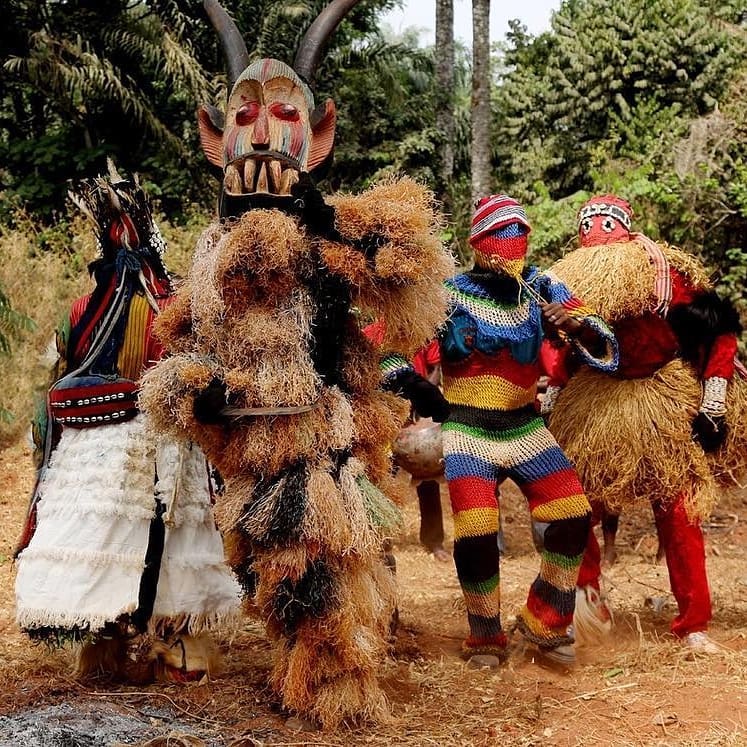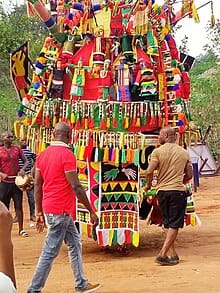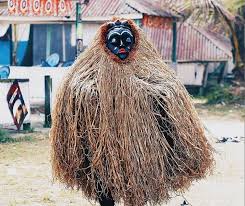Cultural Suppression and Assimilation
"When they couldn't defeat our spirit, they tried to rewrite our story."
The British colonial conquest of Igboland was not just about territory, trade, or taxes — it was about domination of the soul. While gunboats enforced submission on land, another silent weapon worked its way into the heart of the Igbo people: cultural erasure.
From banning sacred traditions to replacing Igbo spirituality with foreign dogma, the British colonial project in Nigeria was a deliberate campaign of cultural suppression and forced assimilation — one with devastating, long-lasting consequences.
Igbo Cultural Heritage Under Threat
These images showcase the rich cultural traditions that colonial authorities attempted to suppress and eradicate. Masquerades, festivals, and spiritual practices were central to Igbo identity and social cohesion before being targeted for elimination.

Mmanwu masquerade performers with traditional masks and costumes. These spiritual embodiments were criminalized as "pagan worship" by colonial authorities.

An Igbo cultural festival featuring vibrant colors and patterns. Community celebrations like these were often restricted or required colonial permission to proceed.

A traditional fiber masquerade costume representing ancestral spirits. Sacred objects like these were often confiscated and sent to British museums as "artifacts."
The Strategy of Erasure
Colonial cultural suppression wasn't random—it was systematic. The British Empire understood that to truly control a people, you must first control how they see themselves. This strategy included:
📚 Rewriting History
Colonial administrators and missionaries deliberately misrepresented Igbo history, portraying pre-colonial society as "primitive" and "savage" to justify their "civilizing mission." Igbo achievements in governance, art, and commerce were minimized or erased entirely.
🏛️ Dismantling Governance
The British replaced traditional Igbo democratic systems with the Warrant Chief system, appointing collaborators who often lacked legitimate authority. This undermined the consensus-based governance that had characterized Igbo society for centuries.
✝️ Religious Conversion
Missionaries portrayed Igbo spiritual practices as "devil worship," criminalizing traditional priests and destroying sacred shrines. The Ibini Ukpabi oracle at Arochukwu was specifically targeted and destroyed during the Aro Expedition of 1901-1902.
🗣️ Language Suppression
English was imposed as the language of government, education, and commerce. Children were punished for speaking Igbo in colonial schools, creating a generation that associated their mother tongue with shame and backwardness.
Colonial Education: Learning to Forget
The colonial education system was perhaps the most effective tool of cultural assimilation. It was designed not to empower, but to create compliant subjects who would serve imperial interests.
The Hidden Curriculum
- Eurocentric Content: History books glorified British achievements while ignoring or denigrating African civilizations. Igbo children learned about British kings and queens but nothing about their own ancestors' accomplishments.
- Christian Indoctrination: Mission schools required conversion and regular church attendance. Traditional Igbo names were replaced with "Christian" names during baptism.
- Cultural Shame: Students were taught to view their parents' traditions as backward and primitive. Traditional clothing, food, and cultural expressions were discouraged or banned outright.
- Limited Curriculum: Education focused on basic literacy and vocational skills needed to serve as clerks, interpreters, and low-level administrators—not critical thinking or leadership.
"I went to school to learn to forget." — Chinua Achebe, reflecting on colonial education
Attacking Igbo Spirituality
Igbo spiritual practices were sophisticated systems that maintained social harmony, preserved ethical standards, and connected people to their ancestors and environment. The British campaign against these practices was particularly devastating.
Criminalization and Destruction
Colonial authorities passed ordinances that criminalized many traditional religious practices, labeling them as "witchcraft" or "juju." Sacred groves were cleared for "development," shrines were burned, and ritual objects were confiscated and shipped to British museums.
The destruction of the Ibini Ukpabi oracle (Long Juju) at Arochukwu was a calculated move to break the spiritual and political power of the Aro Confederacy. Similar attacks targeted other important spiritual centers across Igboland.
Traditional priests and priestesses were arrested, publicly humiliated, or forced underground. Converts were encouraged to demonstrate their new faith by destroying family shrines and sacred objects.
The colonial legal system refused to recognize traditional oaths and divination methods that had maintained justice for generations, replacing them with British courts that often misunderstood local contexts and values.
Redefining Gender and Family
Pre-colonial Igbo society had complex gender systems that gave women significant economic, political, and social power. Colonial policies deliberately undermined these structures, imposing Victorian gender norms that reduced women's autonomy.
Pre-Colonial Igbo Gender Systems
- Women controlled market networks and had significant economic independence
- Female political institutions like the umu ada (daughters of the lineage) and inyom di (wives of the lineage) provided checks and balances
- Title systems like Iyom recognized women's achievements independent of their husbands
- The dual-sex political system ensured women had their own governance structures parallel to men's
Colonial Impositions
- British officials refused to recognize female authority, dealing only with men
- Christian missions promoted the "male household head" model
- Colonial courts undermined women's property rights and economic independence
- Education for girls emphasized domestic skills rather than the commercial education that would have aligned with traditional women's roles
The Aba Women's War: Resistance to Cultural Domination
The 1929 Aba Women's War (often misnamed the "Aba Women's Riots" by colonial authorities) was not just about taxation—it was a direct response to the erosion of women's traditional authority. When the British attempted to tax women without representation and imposed corrupt Warrant Chiefs who abused their power over women, thousands of Igbo women mobilized using traditional protest methods.
Their actions demonstrated the resilience of Igbo cultural systems even after decades of suppression. The British response—shooting unarmed women protesters—revealed the violence underlying cultural imperialism.
Legacy and Ongoing Impact
The effects of colonial cultural suppression didn't end with independence. They continue to shape Nigerian society and Igbo identity today in profound and often painful ways.
Internalized Colonialism
Many Igbo people still carry internalized shame about traditional practices, viewing them as "backward" or "primitive" compared to Western alternatives. This manifests in everything from religious choices to naming practices to aesthetic preferences.
Language Endangerment
The Igbo language is classified as "vulnerable" by UNESCO. Many urban Igbo families no longer teach their children the language, and English remains the language of education, government, and upward mobility.
Religious Transformation
Traditional Igbo spirituality has been largely replaced by Christianity, with many sacred sites and practices lost forever. While some syncretic practices survive, the comprehensive spiritual system that once guided Igbo life has been fragmented.
Governance Challenges
The disruption of traditional governance systems created a vacuum that neither colonial structures nor post-colonial governments have adequately filled. This contributes to ongoing challenges with leadership legitimacy and community cohesion.
Cultural Disconnection
Many Igbo people, especially in the diaspora, feel disconnected from their cultural roots. The knowledge gap created by colonial education means that entire generations have grown up without access to their own historical and cultural knowledge.
Resistance and Cultural Reclamation
Despite centuries of systematic suppression, Igbo culture has demonstrated remarkable resilience. Throughout the colonial period and continuing today, Igbo people have found ways to preserve, adapt, and reclaim their cultural heritage.
Visual Evidence of Cultural Persistence

Despite colonial prohibitions, masquerade traditions survived through secret practice and adaptation, becoming powerful symbols of cultural resistance and continuity.
📝 Literary Resistance
Writers like Chinua Achebe used literature to counter colonial narratives. Achebe's "Things Fall Apart" directly challenged European misrepresentations of Igbo culture, showing its complexity and humanity while also acknowledging its internal tensions.
🎭 Cultural Adaptation
Igbo people adapted cultural practices to survive under colonial rule. Masquerade traditions incorporated new elements while maintaining core spiritual meanings. Christianity was indigenized, with hymns translated into Igbo and worship incorporating traditional musical styles.
🏠 Community Preservation
Village associations and age-grade systems maintained cultural continuity even as external structures changed. These organizations preserved traditional knowledge, settled disputes according to Igbo values, and maintained connections between urban migrants and their ancestral communities.
🌱 Contemporary Revival
Today, there is growing interest in reclaiming Igbo cultural heritage. Language revitalization programs, cultural festivals, and digital archives are helping new generations reconnect with their roots. Scholars are documenting oral histories and traditional knowledge before they are lost.
Join the Cultural Reclamation Movement
Truth Over Empire is committed to documenting, preserving, and revitalizing Igbo cultural heritage as part of our broader mission for justice and accountability.
Share Your Cultural Knowledge
Do you have knowledge of traditional practices, language, or oral histories passed down in your family? Help us document this precious knowledge before it is lost.
Submit Cultural TestimonySupport Cultural Education
We are developing educational resources that present Igbo history and culture accurately, countering colonial misrepresentations and helping new generations connect with their heritage.
Learn About Our Educational InitiativesCultural reclamation is not just about the past—it's about creating a future where Igbo people can live with dignity, pride, and a strong sense of identity.
